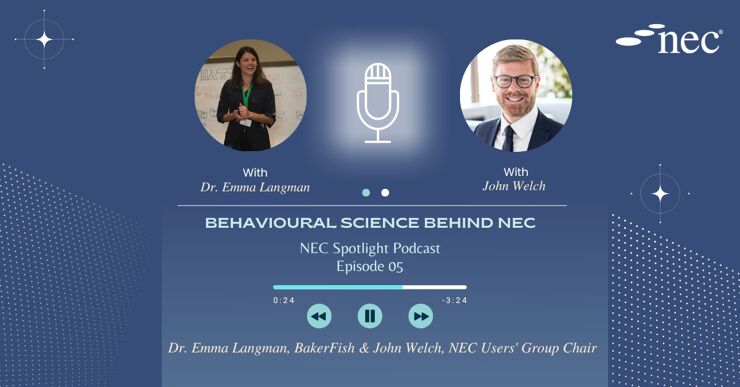
The fifth Spotlight podcast looked at how to achieve collaborative behaviour in NEC Contracts and featured Dr Emma Langman from BakerFish. In conversation with our NEC Users’ Group Chair, Emma explored the philosophy of servant leadership, and ‘leanclusion’ approach and how we can use these ideas to create a collaborative behaviour for NEC users on their contracts.
After gaining a civil engineering degree and a PhD in system thinking, Emma worked as a transport planner before moving into various business management roles. Since setting up BakerFish in 2020, she has advised a number of NEC users on improving their processes, behaviours, and inclusion, an approach she described as 'leanclusion'.
Trust Equation
Both John and Emma discussed the contractual meaning of mutual trust in engineering and how to get the industry to change their behaviour to be more trusting, cooperative, and collaborative. Clause 10.2 requires all parties in the NEC Contract to act in a spirit of mutual trust and cooperation. However, much of the engineering industry still struggles with understanding with what the concept of collaboration means. According to Emma, trust is made of a three-letter acronym: C, R, and I:
- C for competence and capability (is this person able to do the work that they said they were going to do?)
- R for reliability (are they going to keep their promises?)
- I for intimacy (intimacy is not something we’re accustomed to in a workplace environment in the UK, but it is about the importance of paying attention to intimacy and spending time to make that relationship work.)
However, she said if there is self-interest (the fourth part of the equation) in the project, that will make it hard for people to work in a cooperative way.
Looking at the history of engineering relationships within the sector, she said the single supply chain relationship which we conceived of no longer works for complex projects.
‘For a complex infrastructure project to achieve its goals, we need a network of suppliers working together collaboratively. It’s not just a chain. It’s a whole system, and that means making sure the relationships are working across that whole system.’ She cited the examples of ground engineering and the National Highways who try to ensure that there’s collaborative behaviours across their supply network.
Alongside good organisational structure, people planning process, she highlighted that good leadership behaviour is essential: ‘We have to learn as leaders when we apply the NEC contracts to be assertive, to care about the outcome, and to care about one another.’
Servant Leadership and Leanclusion
Emma demystified the concept of servant leadership which many people do not understand what this terminology actually means and its associated behaviours. She said that servant means ‘we’re serving the purpose of the project. We’re all in it to serve the purpose of the project. It’s about being focused on achieving the outcome that we’ve set out to achieve at the outset of the project.’
In today’s work culture, companies increasingly talk about mental health and wellbeing, DEI (Diversity, Equity, and Inclusion). She advocated the leanclusion approach with the focus on inclusion and emphasised the importance of creating a psychological safe space. Diversity, Equity and Inclusion form the basis of her leanclusion approach: ‘Lean comes out from a genuine attempt from the world that is peaceful and free of war. It comprises two core pillars: the concept of continuous improvement and respect for people.’
She passionately believes that inclusion is about engaging people and giving people the environment to thrive and flourish: ‘if we are only concentrating on diversity, people will feel they don’t have the support they need to perform well and will be ineffective. Do I really feel that I belong here? Can I give my best in this place? If people don’t believe that they belong, and that they’re safe, and that their voice matters, they are never going to share their best ideas. If you don’t have psychological safety, you’re not going to get physical safety.’
Her approach drew on the research from the 80s with psychologists which looked into safety and what made great projects work well. The research concluded that it was not about the skills of being competent and reliable: ‘It is about that sense of the climate, the relationship with your line manager which has as much effect if not more effect as your long term health of giving up smoking.’ Emma said that true inclusion will only work if it does not exclude anybody; it has to work also for everybody including ‘the archetypal predominant white middle-aged man.’ This leads on to her next point which she touched on briefly regarding intersectionality. Intersectionality is about finding the common grounds between people and establishing relationships, and it’s crucial to have a leader who can get things done, care about people, uses a few lean tool techniques to help deliver great project outcomes.
Listen to the full podcast interview by downloading our NEC Community app which is free to download onto mobile devices at the Apple and Google stores: www.community.neccontract.com



